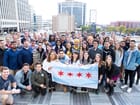This is the 2nd article in a series on “How to Build a Silicon Valley or ‘Rainforest.’” In the first article, we concluded that it’s the ‘software’ or culture not the ‘hardware’ (creative ideas, experienced talent, and abundant capital) that explains the success of Silicon Valley and Israel and is the key to the development of a thriving startup ecosystem. The unique culture of Silicon Valley was forged a long time ago in the settling of the Wild West. It’s the heir to the American frontier spirit. In Israel, compulsory service in the military brings everyone together and creates a tight-knit community.
The secret recipe of ‘Rainforests’ is about people and how they interact with each other. You need the right ingredients (universities, research labs, technical training, government assistance, corporate support, mentors, trade and industry organizations, real estate, business infrastructure, rule of law, media outlets, etc.) but it’s the culture that determines the speed with which the ingredients flow throughout the startup ecosystem and create innovation. You can’t engineer a Silicon Valley or desired outcome any more than you can engineer evolution, but you can create an environment or culture which encourages people to come together, connect, collaborate, and build transformative companies with the potential to change the world.
Human relationships are the most precious resource in the 'Rainforest.' Innovation is about the right relationships, among the right people, at the right time. Behind every successful story of entrepreneurship are the contributions of countless people who provided critical help, who were driven by more than base economic self-interest, and without whom success would never have been achieved. Innovation is a team sport.
Unfortunately, the psychological forces that push people apart are far stronger than the forces that pull people together. People typically treat transactions as zero-sum games with a winner and loser. Partnering in a positive-sum game with strangers where there can be 2 winners is considered naïve. The zero-sum mentality is an innovation killer and explains much of the difficulty in growing startups throughout the world. When people do not approach relationships with the possibility of creating positive-sum games, then the system as a whole will reflect a zero-sum output. According to Phil Wickham, a serial entrepreneur, angel investor, and CEO of the Center for Venture Education: “Venture capital only thrives when it is based on trust, and trust is powered by transparency and connectivity.”
When it comes to innovation, human friction is enough to kill most promising ideas before they get off the ground. At a profoundly deep level, we are not wired to innovate together. Distrust is easier than trust. The positive-sum exchanges required for innovation are the exception, not the rule. Ironically, the most difficult relationships to develop are frequently the ones with the greatest potential value. It takes considerable effort to behave in ways most likely to create the maximum amount of innovation.
Innovative startup companies require a unique environment to thrive that free markets alone do not provide. In most instances, the mixing of the ingredients of innovation does not occur naturally. Specialization and the exchange of goods between disparate individuals as practiced in a classic free market economy are not sufficient. To build 'Rainforests,' you must transform culture which involves creating trust, overcoming social barriers, and minimizing transaction costs between people. According to venture capitalists Victor Hwang and Greg Horowitt, authors of “The Rainforest”: “In the efforts to grow 'Rainforests' in new markets, all approaches that do not focus on cultural transformation are doomed to fail. Leaders, from CEO’s and Prime Ministers on down, should focus more on the recipe, not just the ingredients, of innovation.” A 'Rainforest' is a community of innovators in which transaction costs have been reduced through the creation of trust, social norms, connectivity, and diversity.
In the next article or 3rd part of this series, I will discuss how to build the culture of a 'Rainforest' and bring together the disparate players in a startup ecosystem to optimize creative assembly and foster innovation.





.png)